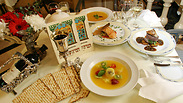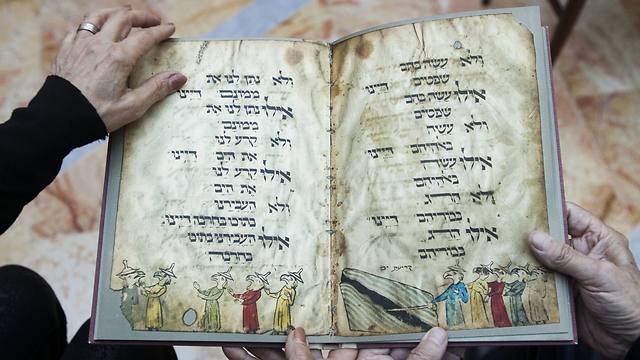
What kind of freedom is Passover realy about?
צילום: שאול גולן
Freedom and enslavement on Passover
Passover is also called the holiday of freedom. But is this true liberty, or are we simply unable to see the shackles we’ve placed on our own feet?
Passover originates from a pagan holiday celebrating the coming of spring. The Jewish people gave it an additional meaning: Freedom. Perhaps these two are connected, since (in spring) the seed erupts from its earthly jail, and the lamb emerges from its womb-prison. Zionism blended these meanings together.

Our return to our homeland was tied to the idea of breaking from the shackles of banishment from Israel and a return to nature. But the nature to which we returned is an enslaving one. It was not the nature of hunter-gatherers, but that of farmers who are dependent on their land and rooted to it – to regime of plowing, sowing, and reaping, and to the scheduled milking of cows.
That's what we have been sentenced to experience ever since being outcast from the Garden of Eden, where we were exempt from the burden of work and contemplation of our own meaning. We received consciousness, but god sentenced us to heavy sweat – and the future would show us that thick slices of the farmer's bread would be going into the mouths of vegetable, milk, and egg merchants, preserved food manufacturers, and owners of supermarket chains.
The results of our heavenly eviction were represented by the Hebrew farmer, carrying a bag of seeds on his hip and sowing with an outstretched arm. The slogan that goes along with this picture is the biblical quote "Those who sow with tears will reap with songs of joy." Sowing and crying. This is the most common painting associated with the Zionist institutions.
The farmer, let's say he's an archetypical example of an old-time settler in Emek Yizrael, works under the limitations of reality, is rooted to the ground, the dirt in which he steps is stuck to his shoes. I think that's a nice metaphor for freedom that is tied to willful enslavement, and if you will – it can be seen as the essence of the Zionist story.
This story has two dimensions: An aspiration for human freedom, which is universal, and the freedom of a nation, which is the singular case of the Jewish people. We should not mock the Zionist propagandists for not adding the story of "redeeming the land" – which was purchased from its masters, leading to the disenfranchising of the Arab fellahs, and eventually their banishment - to this poster. I believe I would not be falling into the trap of idealizing Zionism by saying that in those early days of settling the land, at least some of the more clear-minded and sensitive members of the first-generation did attempt to settle the grating contradiction between the cruelty of our national liberation movement and the knowledge of the disaster it was causing for local Arab residents.
They were acting hypocritically, but as a wise man once said, hypocrisy is the ransom our evil impulses pay to our good qualities. Unconscionable people have no use for it, and indeed, one of the qualities that define the current Zionist hegemony is a lack of hypocrisy: The entire land of Israel is ours, they seem to say, and soon our temple will be built on it.

Modern extremist Jews in Israel are indeed free of hypocrisy, but not necessariy in a good way. (Photo: Getty Images) (צילום: gettyimages)
The problem with this unburdening is that it involves enslavement, and this is where we come back to Passover. I searched for a statement that would define freedom, and found one in the writings of Pyotr Kropotkin, an anarchist thinker from the 19th century. He wrote that personal freedom is that by which we obey natural laws due to our own recognition of them, and not because they have been imposed on us by some outside will, human or divine, collective or personal. Simply put: Not by any god or master.
A person who submits themselves to religious rule, as interpreted by rabbis who have themselves enslaved their minds to the Halakha, which was interpreted by their predecessors, is not a free person. A person who believes that the ancient God is a nouveau riche guy in need of a Hellenistic-type hall, golden instruments, sacrifices, and servants – is no free person. A person who marks the holiday of freedom with a display of enslavement is a slave who can’t see their own predicament.
Kropotkin further wrote that he himself only felt he would be free when all people, men and women, would be free as he was. The freedom of others not only does not contradict his freedom, he wrote, but is a necessary assumption for it, as well as its confirmation. Simply put: As long as we don’t bring freedom to the Palestinian people and keep them under our boots, we ourselves will never be free either.











